Podcast Show crowds out in force
The first confirmation that this Podcast Show was going to be big was the response to some of the Live Podcast Shows being held around London during the week of the conference.
I had managed to get tickets to the podcast Kermode and Mayo’s Take on the Tuesday night before the conference launch the following day.
The show had sold out almost immediately tickets went on sale. Arriving at the wonderful Union Chapel venue in Islington on Tuesday night last week the line to get in went back about 150 metres and then turned around the corner and continued down another street.
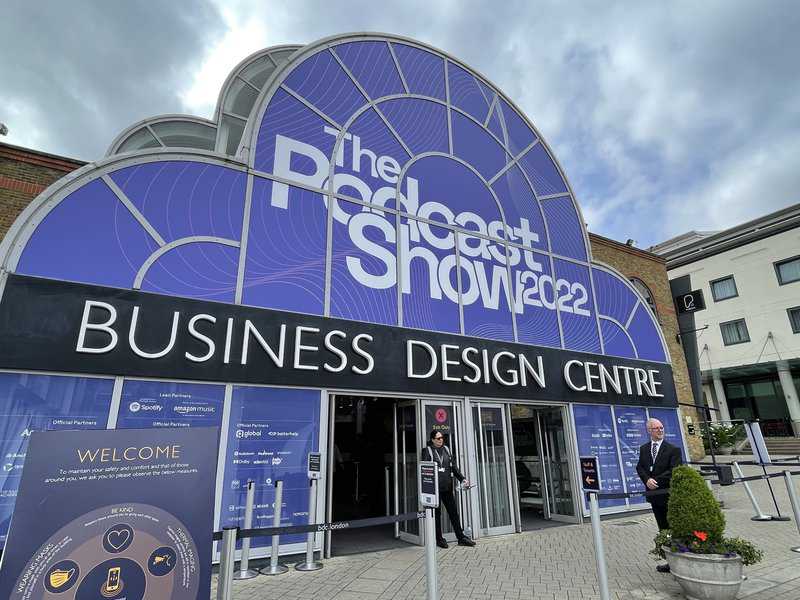
The Podcast Show attracted big crowds and plenty of industry partners. The crowds were helped by the rockstar podcasters scattered across the two-day schedule. The other contributing factor was the ticket price.
An admission fee of £69 for one day and £120 for both was a bold move and no doubt brought in many interested observers who have their own indie podcasts through to the major players.
It was almost the battle of the brands in the exhibition hall. Taking into consideration session branding and floor space impact, Spotify seemed to be the brand winner. But it was a close run thing though with other brands cutting through including Acast, Amazon Music, Audible, BBC Sounds and YouTube.
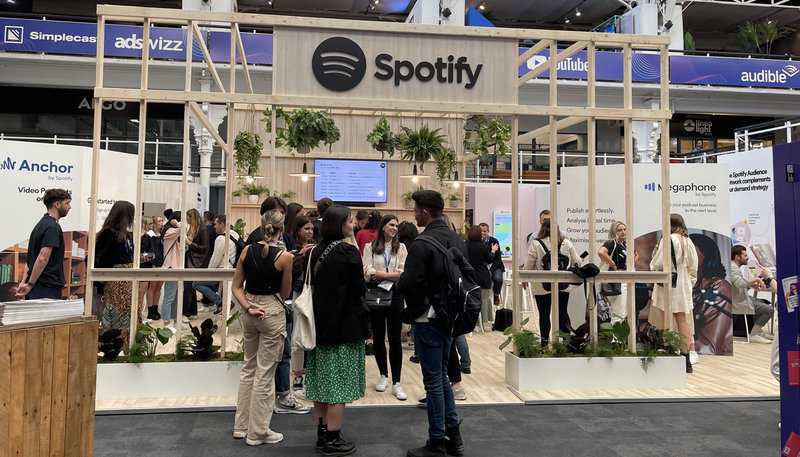
It was impossible not to be confronted by Spotify many times during The Podcast Show
Also making a noise with the attendees were Triton, Campaign, Shure, Marshall, Global, The Guardian, Zoom and probably many others I didn’t get time to visit.
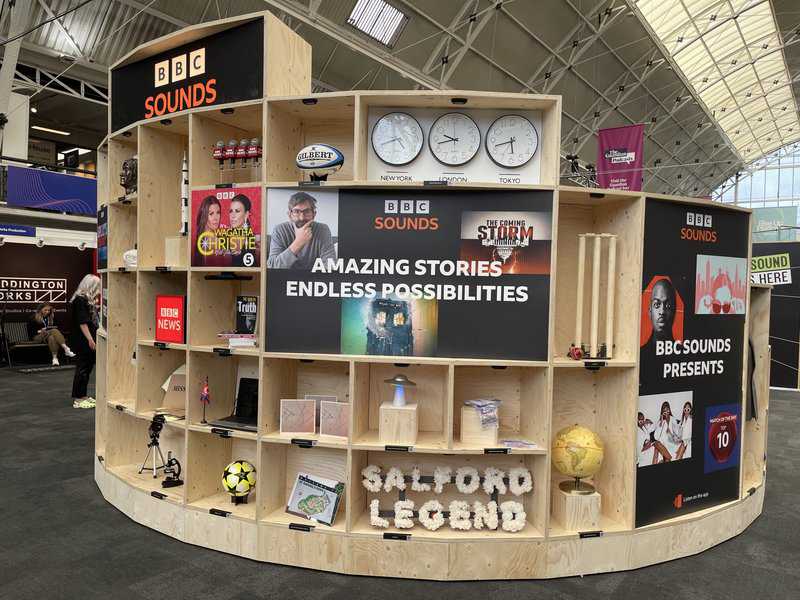
The Podcast Show sessions: Quantity and quality
Like the podcast fever for Kermode and Mayo on Tuesday night, the line to get inside The Podcast Show on the first morning snaked down the street outside the Business Design Centre in inner North London. There was plenty to keep people busy on Day 1 – 71 sessions in 11 different event rooms and theatres.
Brisbane-based radio futurologist and Podnews editor James Cridland kicked off the day with his Future of Podcasting session.
Interview the interviewer (Session curated by My Dad Wrote a Porno)
Much of the first day featured sessions either curated, hosted by or starring members of the team responsible for the hit podcast My Dad Wrote a Porno – Alice Levine, James Cooper and Jamie Morton.
A crowd packed into the Spotify-sponsored Origin Theatre on the first morning for Levine interviewing British broadcasting stars Louis Theroux and Emily Maitlis.
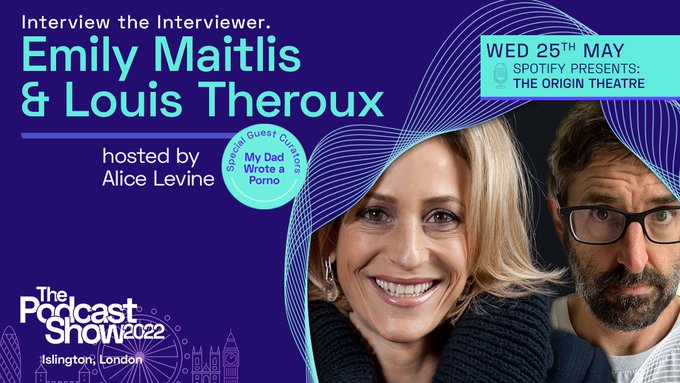
Theroux and Maitlis were asked about their different podcast styles. Maitlis said this had got her into trouble in the past, but she quoted someone else describing a well-worn interview technique – start off seducing the guest and then going a little harder.
Theroux agreed with Levine’s description of him being a disarming interviewer. He said he liked the question, because it suggested he actually had a style and it was something he might have thought about!
Maitlis talked about her Prince Andrew BBC interview and was asked if it could have worked as a podcast. She said we weren’t quite at a place where a podcast like that would have the same gravitas as the TV interview. (Maitlis has since quit the BBC to co-host a daily news podcast for Global via indie audio company Persephonica.)
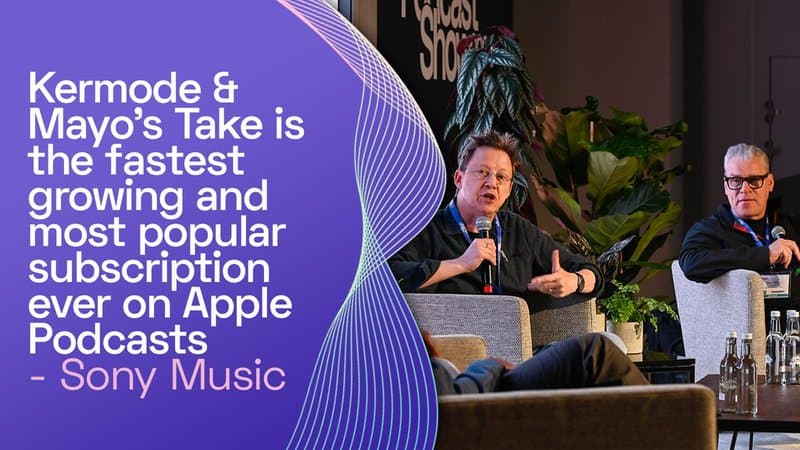
Kermode and Mayo’s Take explained
It was revealed during this session that the podcast had become the fastest-growing subscription podcast on the Apple platform in the UK in its first three weeks.
The film critic and the DJ recalled how they met over two decades ago and again explained the model where it has gone from free to ad and subscription-supported. The fact that it seems to be working indicates the negative reviews from listeners in the App Store won’t prevent this from being a success.
The radio show and podcast used to be free via Radio 5 and BBC Sounds. They signed with Sony Music Podcasts some time ago and more recently left the BBC. The new podcast is split into two parts – the first is free and carries ads. The second part each week is available by subscription only.
The relaunched podcast has had massive media coverage in the past month partly because of the media connections of the hosts (The Sunday Observer – where Kermode is a film critic – gave the podcast a cover splash and six pages inside) and the good work of the Sony Music Entertainment London comms team.
Supercharging Subscriptions: So many decisions to make
Hosted by James Cridland, this session featured Emily Rasekh from Sony Music, Gee Linford-Grayson from Patreon and Steve Wilson from QCODE. Wilson is a former Apple executive now working on the new company which has a focus on scripted fiction podcasts.
Rasekh noted that despite the company’s heritage, the Sony Music podcast division has few music podcasts. It sees itself very much as a general content creator.
During the session, the New York-based Rasekh revealed the impending launch of The Binge on-demand podcast platform.
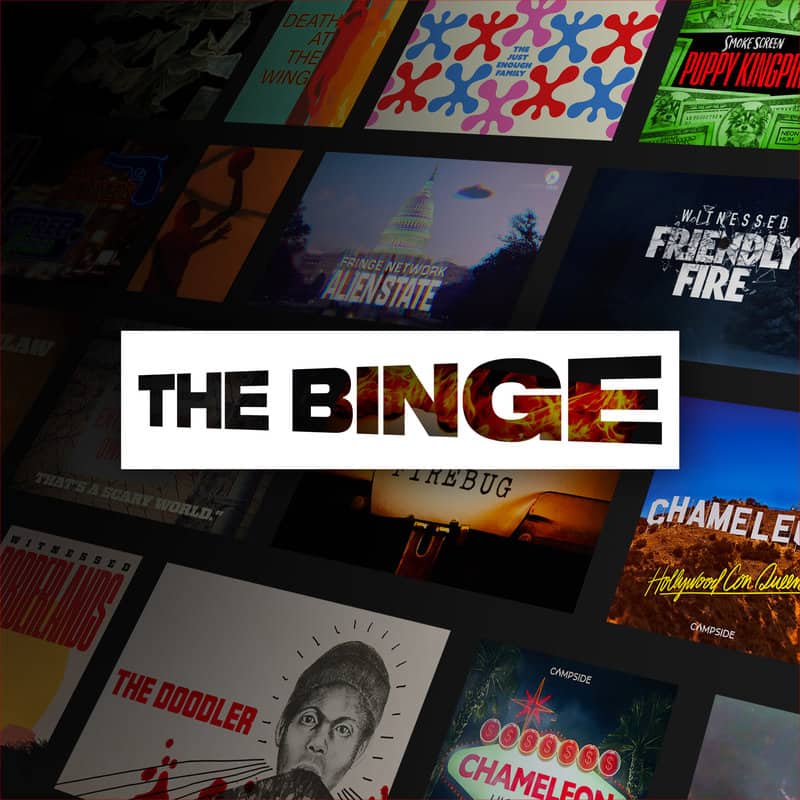
Sony Music Podcasts is testing subscription models too, particularly with Kermode and Mayo’s Take.
As to podcasts going on to Spotify, Rasekh agreed with other panellists that there are backend challenges they face plus it is a very different user experience.
Linford-Grayson noted that the platform where users pay creators directly by a monthly subscription fee is really Patreon 2.0.
She said the lack of ads is a big attraction for Patreon listeners because they don’t get taken out of the show.
A lot of Patreon podcasters are also frustrated after working on other platforms.
As to Patreon earnings, Linford-Grayson explained a lot of people have started small and developed substantial revenues.
Their customers have a number of revenue streams with an average 40% of revenues coming from Patreon.
Pricing: £4 (about Aus$8) with bonus audio is the sweet spot for a monthly subscription fee.
QCODE’s Steve Wilson said they would like to have their series on Spotify, but there are some workflow challenges.
“We would love to be on all platforms – not just Apple. Would like to be on Android devices too,” he told Cridland.
Subscription revenues are significant for QCODE. Wilson said it’s not a lot of extra work to set up subscriptions for people to listen ad free.
The company charges US$2.99 (just over Aus$4) monthly for QCODE+ which they thought was a good place to start. QCODE said it also had good success with shows on YouTube.
In the session, Cridland asked the panellists about being paywall only. QCODE prefers wider distribution. Sony Music Entertainment will be platform agnostic with as big a distribution as possible. Patreon doesn’t recommend paywall only. But it then shared some examples where it has worked successfully for specialist podcasts.
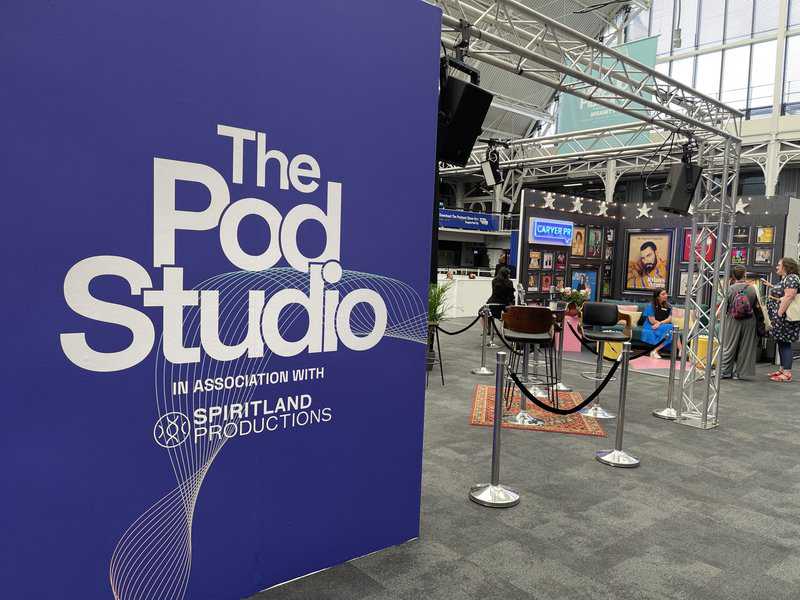
Advertising innovation and podcast monetisation
In this session, the global head of automation at Acast, Michael Bayston, told podcasters: “We can do something better than the experience of the web where you can be chased around the internet by an ad which is an appalling experience.”
He also added: “Do something different to programmatic – we don’t want to promote bad ads.” He also addressed other issues surrounding ad serving, measurement, data and targeting, and execution.
Chelsea Bradbury, Spotify head of UK publisher partnerships, talked about the acquisition of Whooshkaa and the associated benefits. New York Public Radio’s SVP of sponsorship Rebecca Kaplan also gave a shout out to Rob Loewenthal, noting they too worked with Whooshkaa. Kaplan noted the challenges many podcasters face trying to keep up with business growth: “With downloads up 80% YOY how do we keep up?”
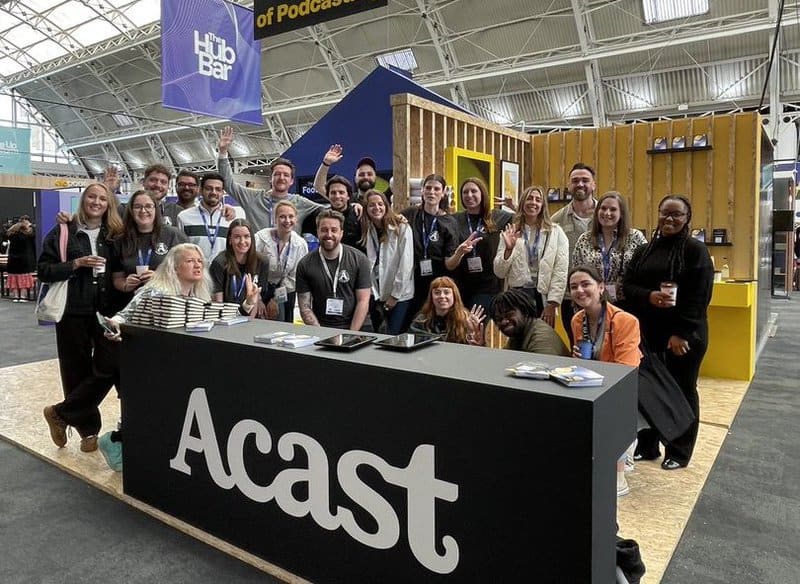
Team Acast at the Podcast Show
Getting paid to podcast
Toward the end of a busy first day I refer to my scribbled notes about this session hosted by Acast’s UK & IE commercial development manager, creator networks, Kate Mander.
Without remembering who said what, here are some of the thoughts from three (Acast) podcasters on the panel.
• Build your trust with the audience and never break it.
• Sound confident about your product – don’t be too self-deprecating about your achievements.
• Partner strategically with companies.
• Use many platforms to support the podcast including Twitter, Facebook and Instagram.
• Don’t think about how to make money, think about making something that is good. If it’s good it will make money.
• The freedom to try ideas is what makes podcasting great.
• Interact with the audience all the time. “I spoke with the audience to explain why I was introducing ads and explained my decisions about who I would and wouldn’t work with,” said Real Life Ghost Stories’ Emma Ozenbrook.
• Some people will never like ads in your podcast – but you have to let it go.
• Know when to say no to ads.
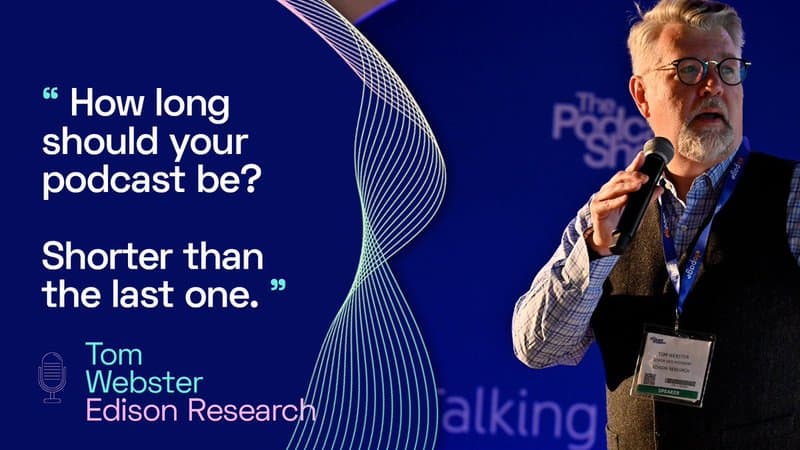
The Guardian on perfect podcast planning
This session was held in a small conference room outside The Guardian’s podcast display space. The Guardian’s Guy Edmunds spoke frankly about the podcast landscape, and also revealed why he is a super salesman with plenty of plugs for the business along the way.
Edmunds started reminding the small but packed room that it was a Guardian journalist who first used the term “podcast”. He also reckoned the publisher is the largest commercial podcast company in the UK.
For perfect podcast planning, he noted you have to answer questions including how effective is podcast advertising.
Reasons that advertisers should be attracted to the sector include podcast consumption is growing faster than any other medium. Listeners are younger and more diverse than the perception some have and it boasts the highest levels of attention of all media.
Edmunds offered a slide showing where podcasts best sat in the purchase journey of a consumer. He said all media can be effective in creating awareness, adding radio is good at the start of the journey while print helps brands stand out. He said print was also good at increasing brand trust while video in-read plus digital branded content and digital display help brands feel relevant and can convey new information, driving purchase and word of mouth. So where does podcasting play an important role – purchase and recommendation.
“The personal nature of podcasts means they are particularly effective at telling people something new about a brand, raising perceptions of it and ultimately driving purchase and word of mouth.”
Edmunds and his colleague from The Guardian, director of advertising and former fashion journalist Imogen Fox, noted their podcast listening is up 60% since the start of the pandemic.
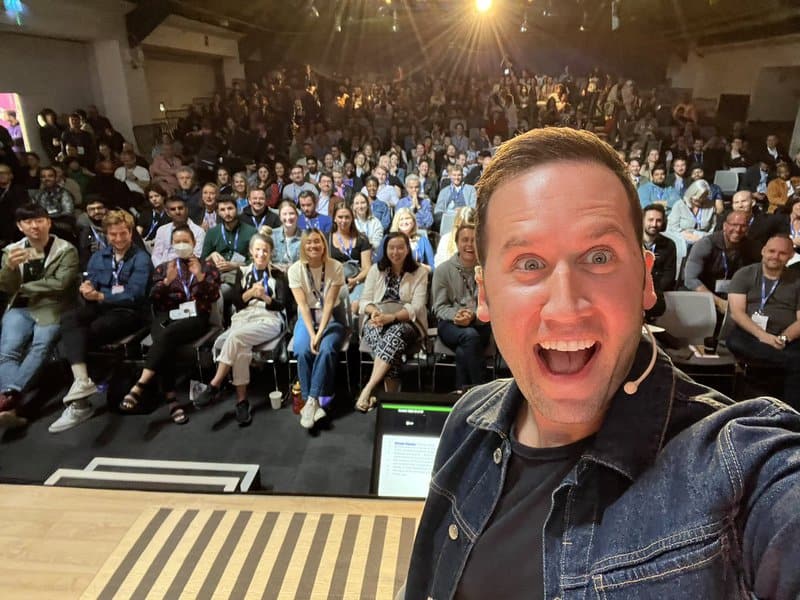
Rockstar Spotify presenter Michael Mignano
How Spotify is reimagining podcasts
Another full-to-capacity session was hosted by the Spotify duo of global head of talk Michael Mignano and director of R&D talk verticals Maya Prohovnik. They had contrasting presentation skills with Mignano owning the stage like a rockstar while Prohovnik was more like a thoughtful stand-up comedian. Mignano co-founded Anchor and stayed on with Spotify after it acquired the business. Prohovnik had worked alongside Mignano for some time and was his first hire after starting Anchor.
They noted the acquisitions of Anchor and Gimlet transformed Spotify and introduced many new listeners to podcasting. After the Anchor acquisition, Spotify started giving more creators the opportunity to monetise their content.
Creators don’t need a huge audience to make money with Spotify. Any podcast with 15 or more listens qualifies for the Anchor platform and gets access to ads. As the podcast grows it can join the Spotify Audience Network.
Spotify offers creators ad dollars and subscriber revenue.
A podcaster can also use music on Spotify podcasts, but only one track from the Spotify catalogue can be featured in a talk podcast and the music creator gets paid.
Another format on offer from Anchor by Spotify is video podcasts on the Spotify platform. This comes via a partnership with Riverside earlier this year and offers a free solution to record video podcasts.
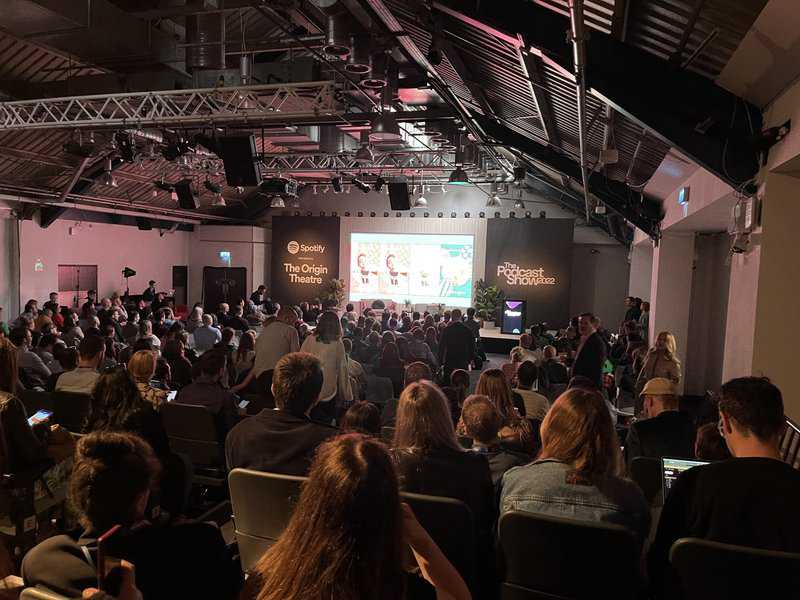
Too many sessions…too little time
The above summaries don’t even start to scratch the surface of what was on offer. They do however give a taste for some of the insights shared. A couple of brief takeaways from some other sessions:
It’s all in the data: Examining the data can help explain why people might say one thing and do another. Data shouldn’t be used to influence the creativity, or replace gut feel. It should be used though to help shape gut feel.
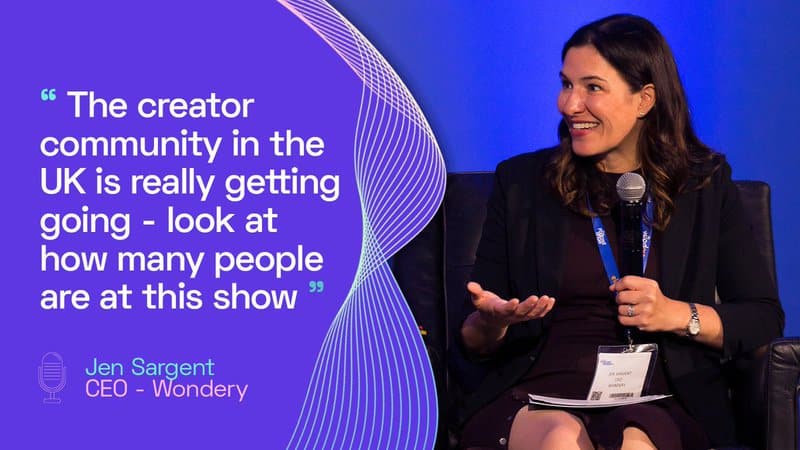
Wondery chief executive Jen Sargent: The boss of the Amazon Music-owned network gave an impressive talk about how she got to the top job after a career that included banking, time with Reed Business Information, a venture capitalist and CEO and co-founder of HitFix. Sargent talked about how Wondery was quietly expanding in the UK and Europe. She cited two major successes that were turning points for the company – Dr Death and Dirty John. Ad revenue and subscription dollars will grow as markets mature. “It’s not if, but when.” Another bit of advice: When you budget for a podcast, spend half of it on marketing to make sure people know about it. Wondery is represented in Australia by Rob Ranieri and Nick Randall and Ranieri & Co.
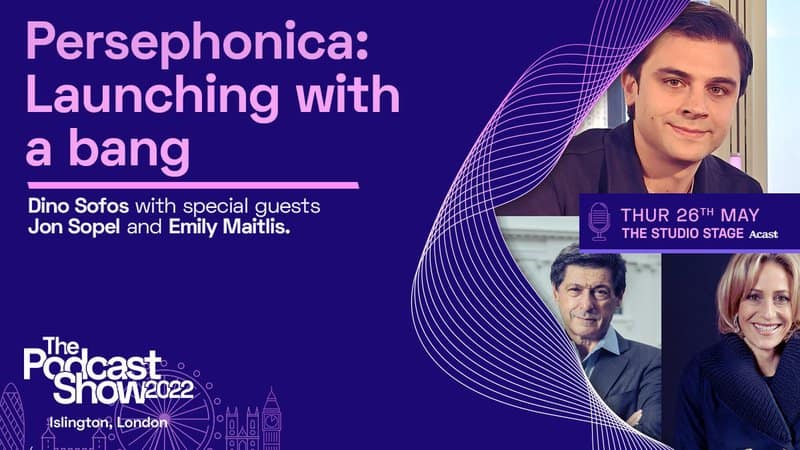
Broadcast stars start their own indies: London Podcast Show speakers or hosts included broadcasters who have launched or joined indie production companies. They included Goalhanger Productions director and footballer-turned-host Gary Lineker (who was joined onstage by Acast CEO Ross Adams). Another revealing session was former BBC journalist and producer Dino Sofos who launched Persephonica after leaving the government broadcaster. He was joined on stage by former BBC colleagues Emily Mantis and Jon Sopel who have also quit their jobs for hosting roles on a new daily news podcast Sofos is launching for Global in September.